DOWNLOAD NEWS 2015/5
by Brian Wilson and Dan Morgan
Reviews are by Brian Wilson unless otherwise stated.
DL News 2015/4 is here
and the archive is here.
2015/5 Index:
ADDISON, ALWYN, ARNOLD, AURIC, BAX, BENNETT, BERNERS, BLACK, CHAGRIN,
GOODWIN, KORNGOLD, LAMBERT, RAWSTHORNE, SHOSTAKOVICH, VAUGHAN WILLIAMS
Film Music_Chandos USB
ALFEVEV Stabat Mater; De profundis, etc._Alfeyev_Pentatone
BACH JS Cantata 63; Magnificat_Herreweghe_Harmonia Mundi
D’Abord
- Cello Suites_Watkin_Resonus
- Keyboard Concertos arr. Mandolin_Avital_DG
- Motets_St Thomas Choir NY_Resonus
BALADA Symphony 6, etc_López-Cobos
BARTÓK Viola Concerto_Wallfsich + SEIBER, DORATI_Nimbus
BERKELEY Lennox _Chamber Music_Berkeley Ensemble_Resonus
BERLIOZ Harold in Italy, etc._A.Davis_Chandos
BLISS Beatitudes, etc_Bliss_Lyrita
BRAHMS Clarinet Quintet, etc_Ottensamer_DG
BRUCKNER Symphony No.7_Young_Oehms
BUSH Concerto for light orchestra; Sinfonia Concertante, etc_Ward_Lyrita
- Symphonies 1 and 2, etc._Lyrita
CHEN Butterfly Lovers Concerto_Lu Siqing_BIS
ERÖD Violin Concerto, etc_Irnberger_Gramola
GALLAY Songs of Love, War and Melancholy_Scott, etc._ Resonus
GOLOVIN Bambi _Melodiya
- Symphonies 1 and 4, etc._Golovin, etc._Toccata
HOUGH Missa Mirabilis _Litton + VAUGHAN WILLIAMS_Hyperion
IBERT Le Chevalier Errant; Les Amours _Mercier_Timpani
- Les Amours_Ibert (1954)_Naxos Historical
JACQUET of Mantua Missa Surge Petre, etc._Brabant Ensemble_Hyperion
JANÁČEK Taras Bulba, etc._Järvi_Chandos
KORNGOLD Lieder des Abschieds; Symphony_Downes_Chandos
- Robin Hood_Stromberg_Naxos
MARTINŮ Concert for 2 pianos_Bizjak Duo + STRAVINSKY, POULENC,
SHOSTAKOVICH_Onyx
MASSENET Le Cid, etc_Järvi_Chandos
OSTRČIL Calvary _Neumann_Supraphon
POULENC Concerto for 2 pianos – see Martinu
RAVEL Daphnis et Chloë; Pavane_Nézet-Séguin_BIS
RICHAFORT Requiem _King’s Singers_Signum
SEIBER Tre Pezzi – see Bartók
SHOSTAKOVICH Concertino for 2 pianos – see Martinu
STRAVINSKY Sonata for 2 pianos – see Martinu
TANEYEV Quintets_Taneyev Quartet_Norther Flowers
- Martinu Quartet_Supraphon
TELEMANN Wind Band_Syrinx_Resonus
TOWER Violin Concerto, etc._Lin_Naxos
VAŇHAL (WANHAL) String Quartets_Lotus Quartet_CPO
VAUGHAN WILLIAMS Dona Nobis Pacem _Litton + HOUGH_Hyperion
VIVALDI Concertos arr. Mandolin_Avital_DG
Collections:
Argentum et Aurum _Ensemble Leones_Naxos
B.B. King – The Memorial Album_King_Sandrwe Metronome
France-Espagne (CHABRIER, etc) Les Siècles_Actes
Sud
Horizon 2 – a tribute to Olivier Messiaen_Benjamin, Metzmacher_RCO
Per M. Pisendel Sonatas by VIVALDI etc._La Serenissima_Avie
***
Resonus Classics
I’ve fallen somewhat behind in the coverage of Resonus Classics. They
began a comparatively short while ago but have already built up an impressive
catalogue of over 50 titles. Having begun as download-only, they have
now started to offer some of their recent releases on CD but still qualify
for the Download News.
 The
Saxon Alternative: Telemann Music for Wind Band is exactly what
it says on the label: performances by Syrinx of the Overture-Suites
in F, TWV44/7, in c minor, TWV55c3, in B-flat, TWVB3 and in F, TWV44/14
and the Concerto a5 in D, TWV44/2 (RES10154 [61:48]). Download
with pdf booklet from eclassical.com
(mp3, 16- and 24-bit lossless) or resonusclassics.com
(additionally in aac).
The
Saxon Alternative: Telemann Music for Wind Band is exactly what
it says on the label: performances by Syrinx of the Overture-Suites
in F, TWV44/7, in c minor, TWV55c3, in B-flat, TWVB3 and in F, TWV44/14
and the Concerto a5 in D, TWV44/2 (RES10154 [61:48]). Download
with pdf booklet from eclassical.com
(mp3, 16- and 24-bit lossless) or resonusclassics.com
(additionally in aac).
I wouldn’t wish to be without the originals of these works but the wind
band arrangements are very enjoyable when they are as well performed
and recorded as this.
Two recent releases feature the music of Johann Sebastian BACH (1658-1750).
Coincidentally both feature music about which I have always been somewhat
lukewarm from a composer whose other music would have to feature largely
on my Desert Island.
 The
Cello Suites, BWV1007-1012 have never been my favourite JSB works:
as I wrote with regard to a recent Arcana reissue of performances by
Wieland Kuijken, I find them alone among his often intellectually-demanding
music a little too cerebral to love them. In fact I enjoyed the sonatas
for gamba and keyboard on that 3-CD set more than the cello suites (Arcana
A383 – review).
Could David Watkin’s new recording do the trick for me? (RES10147,
2 CDs [145:01] – from resonusclassics.com
or eclassical.com
(mp3, 16- and 24-bit lossless, with pdf booklet, from both; additionally
in aac from Resonus).
The
Cello Suites, BWV1007-1012 have never been my favourite JSB works:
as I wrote with regard to a recent Arcana reissue of performances by
Wieland Kuijken, I find them alone among his often intellectually-demanding
music a little too cerebral to love them. In fact I enjoyed the sonatas
for gamba and keyboard on that 3-CD set more than the cello suites (Arcana
A383 – review).
Could David Watkin’s new recording do the trick for me? (RES10147,
2 CDs [145:01] – from resonusclassics.com
or eclassical.com
(mp3, 16- and 24-bit lossless, with pdf booklet, from both; additionally
in aac from Resonus).
There’s certainly some very fine playing here from a very versatile
cellist whose output in the works of other composers I have found consistently
excellent: he featured on Resonus’s very first and very impressive album,
for example, the original version of Mendelssohn’s Octet (RES10101
– DL
Roundup March 2011/2). I still find these suites rather too cerebral
but I see no reason not to place Watkin somewhere near the top of the
pile, especially as the 24-bit recording is so very good and all the
other top recommendations are now becoming somewhat long in the tooth,
with the exception of Stephen Isserlis, also available in better-than-CD
sound, 20/44.1, and also somewhere near the top of the pile (Hyperion
CDA67541/2:
Recording of the Month – review
or CDA30001/2 – DL
Roundup October 2010).
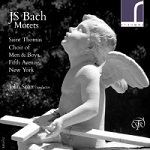 The
other release features the Motets, BWV225-230 and BWV Anh.159,
sung by the St. Thomas Choir of men and boys, Fifth Avenue, New York,
on RES10152 [68:34] – from resonusclassics.com
(aac, mp3, 16- and 24-bit lossless, with pdf booklet). As it happens,
the Motets are my one serious blind spot in Bach’s sacred music. I
love his cantatas and often turn to them to de-stress but I’ve never
managed to do more than admire the motets, though I’ve listened to several
highly regarded recordings, most recently to the budget-price reissue
of a Conifer recording by the choir of Trinity College, Cambridge and
Richard Marlow (Alto ALC1271 – review).
I liked that recording more than other versions from Herreweghe (Harmonia
Mundi and PHI) and Christophers (budget-price Hyperion) which I compared,
but still found myself still somewhat lukewarm about the music. Dominy
Clements seems to have had a similar reaction to the recent recording
by Capella Cracoviensis (Alpha 199 – review).
The
other release features the Motets, BWV225-230 and BWV Anh.159,
sung by the St. Thomas Choir of men and boys, Fifth Avenue, New York,
on RES10152 [68:34] – from resonusclassics.com
(aac, mp3, 16- and 24-bit lossless, with pdf booklet). As it happens,
the Motets are my one serious blind spot in Bach’s sacred music. I
love his cantatas and often turn to them to de-stress but I’ve never
managed to do more than admire the motets, though I’ve listened to several
highly regarded recordings, most recently to the budget-price reissue
of a Conifer recording by the choir of Trinity College, Cambridge and
Richard Marlow (Alto ALC1271 – review).
I liked that recording more than other versions from Herreweghe (Harmonia
Mundi and PHI) and Christophers (budget-price Hyperion) which I compared,
but still found myself still somewhat lukewarm about the music. Dominy
Clements seems to have had a similar reaction to the recent recording
by Capella Cracoviensis (Alpha 199 – review).
The new Resonus recording comes as near as anything that I have heard
to converting me to the cause of the motets: singing, recording and
documentation are all good. The notes by Bach scholar John Butt even-handedly
consider the vexed question of whether the music should be sung with
colla parte instrumentation. The instrumentalists on the recording
are never obtrusive and that’s probably as it should be.
 I
hadn’t even heard of Jacques-François GALLAY (1795-1864) until
Resonus released two earlier recordings of his music on RES10114 – DL
News 2012/20 – and RES10123 –
DL News 2013/14. Now they bring us an album entitled Songs of
Love, War and Melancholy, a series of fantasias on operatic music
by Donizetti, Bellini and Mercadente, performed by Anneke Scott (natural
horn – Gallay’s own instrument), Steven Devine (piano) and Lucy Crowe
(soprano) (RES10153 [66:41] – from resonusclassics.com
or eclassical.com,
both mp3, 16- and 24-bit lossless, with pdf booklet). In keeping with
the use of the natural horn, the piano used is a rather dry-sounding
Érard from about 1851.
I
hadn’t even heard of Jacques-François GALLAY (1795-1864) until
Resonus released two earlier recordings of his music on RES10114 – DL
News 2012/20 – and RES10123 –
DL News 2013/14. Now they bring us an album entitled Songs of
Love, War and Melancholy, a series of fantasias on operatic music
by Donizetti, Bellini and Mercadente, performed by Anneke Scott (natural
horn – Gallay’s own instrument), Steven Devine (piano) and Lucy Crowe
(soprano) (RES10153 [66:41] – from resonusclassics.com
or eclassical.com,
both mp3, 16- and 24-bit lossless, with pdf booklet). In keeping with
the use of the natural horn, the piano used is a rather dry-sounding
Érard from about 1851.
I very much enjoyed RES10114, its successor slightly less so. Anneke
Scott’s performance on the natural horn is little short of miraculous
and I enjoyed the virtuosity of her display on such a difficult instrument
but ultimately I left with the feeling that this was an interesting
rather than a vital recommendation and that’s how the new third release
leaves me: go for RES10114 first, if you haven’t yet done so, then sample
the new album from Qobuz.
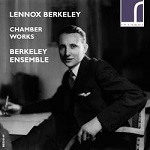 RES10149
[59:37] offers a programme of Lennox BERKELEY (1903-1989) Chamber
Works, including the Sextet, Op.47 [14:39], the String Trio, Op.19
[15:49] and the Sonatine for clarinet and piano [12:11], performed by
the eponymous Berkeley Ensemble, whose earlier recording, entitled Clarion
Call (RES10127), I reviewed
last year. Given Resonus’s aptitude for bringing us neglected works,
it’s not surprising that there is only one other recording of the Sextet,
from another enterprising label (Lyrita SRCD.256 – review
– review).
Similarly the String Trio features on only one other recording (budget-price
Regis RRC1380, with other Berkeley chamber music – review)
and there is no other current recording of the Sonatine. All
of the music is attractive – none of it deserves to be so little known
– and the Berkeley Ensemble give fine performances of the composer whose
name they bear. The recording is good and the lavishly illustrated
booklet would not shame even Hyperion. From resonusclassics.com
(aac, mp3, 16- and 24-bit lossless) or eclassical.com
(as from Resonus except aac). Pdf booklet from both.
RES10149
[59:37] offers a programme of Lennox BERKELEY (1903-1989) Chamber
Works, including the Sextet, Op.47 [14:39], the String Trio, Op.19
[15:49] and the Sonatine for clarinet and piano [12:11], performed by
the eponymous Berkeley Ensemble, whose earlier recording, entitled Clarion
Call (RES10127), I reviewed
last year. Given Resonus’s aptitude for bringing us neglected works,
it’s not surprising that there is only one other recording of the Sextet,
from another enterprising label (Lyrita SRCD.256 – review
– review).
Similarly the String Trio features on only one other recording (budget-price
Regis RRC1380, with other Berkeley chamber music – review)
and there is no other current recording of the Sonatine. All
of the music is attractive – none of it deserves to be so little known
– and the Berkeley Ensemble give fine performances of the composer whose
name they bear. The recording is good and the lavishly illustrated
booklet would not shame even Hyperion. From resonusclassics.com
(aac, mp3, 16- and 24-bit lossless) or eclassical.com
(as from Resonus except aac). Pdf booklet from both.
***
Chandos Film Music on USB
 Quite
some time ago I mentioned Chandos’s experiment in making bundles of
music available at an attractive price on USB memory sticks, usually
around a dozen CDs in both lossless sound – choose wma or flac – and
mp3. Other providers have briefly experimented with the idea, which
is like downloading without the time and effort, notably Warner with
their complete Teldec Bach and Daniel Barenboim’s complete Wagner Ring
cycle, but never on the scale of Chandos. Nimbus and fellow Wyastone
Estate label Hallé have followed another path with mp3 CDs of Beethoven,
Haydn and Wagner, the contents of which have to be copied to your hard
drive to avoid gaps between tracks. The lossless files on the Chandos
USBs can be played direct from an amplifier or blu-ray player which
supports them; oth erwise they, too, need to be copied to your hard
drive – a simple drag-and-drop procedure.
Quite
some time ago I mentioned Chandos’s experiment in making bundles of
music available at an attractive price on USB memory sticks, usually
around a dozen CDs in both lossless sound – choose wma or flac – and
mp3. Other providers have briefly experimented with the idea, which
is like downloading without the time and effort, notably Warner with
their complete Teldec Bach and Daniel Barenboim’s complete Wagner Ring
cycle, but never on the scale of Chandos. Nimbus and fellow Wyastone
Estate label Hallé have followed another path with mp3 CDs of Beethoven,
Haydn and Wagner, the contents of which have to be copied to your hard
drive to avoid gaps between tracks. The lossless files on the Chandos
USBs can be played direct from an amplifier or blu-ray player which
supports them; oth erwise they, too, need to be copied to your hard
drive – a simple drag-and-drop procedure.
Two of these bundles offer 11 CDs-worth each of Film Music, one of the
big strengths of the Chandos catalogue, at £99.99 each, slightly less
than if you purchased lossless downloads of each of the constituent
albums at £9.99 each. The single albums remain available separately
on CD and download.
Volume 1 (CHUSB0003) – from chandos.net
contains music by:
• Arnold BAX from CHAN10126 – reviews.
Of all the composers represented here, Bax was the most diffident about
writing film music and there’s little here to match his tone poems and
symphonies, but don’t be too put off by the slightly negative response
of our two reviewers. As both agree, the performances are about as
good as it gets.
• Dmitry SHOSTAKOVICH (Volume 2) from CHAN10183
– review
and DL
News 2013/13
• Ralph VAUGHAN WILLIAMS (Volume 2) from CHAN10244.
This contains the pick of VW’s film music – review
and DL
Roundup November 2011/2. Volumes 1-3 of VW’s Film Music are also
available on a 3-for-2 set CHAN10529.
• Malcolm ARNOLD (Volume 1) from CHAN9100
– review
• Volume 2) CHAN9851 – review.
These two volumes mainly present the more easy-going side of Arnold,
especially the St. Trinian’s music on volume 2. The symphonies
present a different picture of a man for whom life was seldom easy and
Chandos have just reissued the complete set, conducted by Richard Hickox
(1-6) and Rumon Gamba (7-9), as a box set at an attractive price. (CHAN10853X,
4 CDs).
For a more complete suite of music from The Roots of Heaven and
David Copperfield, restored by John Morgan and reissued by Naxos
from a Marco Polo original (8.573366), see DL
News 2015/3.
• William ALWYN (Volume 1) from CHAN9243 –
review
of Alwyn’s music. I’m a great admirer of Alwyn’s symphonies on Naxos,
Chandos and especially those conducted by the composer on Lyrita but
some of the film music on this volume and its successor are almost in
the same league.
(Volume 2) from CHAN9959 – review
• Alan RAWSHTORNE from CHAN9749 – review
• Georges AURIC from CHAN9774 – review
• Sir Richard Rodney BENNETT from CHAN9867
– review.
I had only one reservation when reviewing this album in DL
Roundup January 2012/2 in that three of the tracks are also available
on a 2-for-1 album British Film Classics CHAN241-12.
If you don’t want to go the whole hog with these 11-CD USB sets, that’s
a very worthwhile alternative.
• Sir Arthur BLISS from CHAN9896 – review
– review
Volume 2 (CHUSB0004) – from
chandos.net:
• Ron GOODWIN from CHAN10262 – review
and DL
Roundup
• Clifton PARKER from CHAN10279 – review
This was a real discovery for me: I don’t think I’ve heard Parker’s
music since I saw the Treasure Island film aged about 7, and
I didn’t even know who the composer was. Though his chef d’œuvre
was sea music, he also gets us in a Tudor mood with his music for The
Sword and the Rose and Blue Pullman takes us from London
to Manchester on the train of that name in the 1960s before Dr. Beeching
ripped up half of the track between Manchester and Derby and closed
the Manchester terminal, Central Station, thus condemning the train
companies to just one route on that busy service.
• Stanley BLACK from CHAN10306 – review.
With a reputation as a middle-of-the-road musician Stanley Black would
seem to have been the ideal composer of film music. How you rate the
music here may depend on how you react to his borrowings from the likes
of Offenbach, Grieg, Tchaikovsky and Mussorgsky, which I found a little
tedious.
• Francis CHAGRIN from CHAN10323 – review
– review.
As with the Addison recording below, I could more easily have named
the films for which the music was written, such as Colditz Story
and Greyfriars Bobby than named the composer.
• Erich KORNGOLD (volume 1) from CHAN10336
– review
and review
See below for a complete recording of the Robin Hood music, here
represented by a short suite.
• (volume 2) from CHAN10438 – review
and
DL Roundup July 2012/2. Not quite the complete music forThe
Sea Hawk: it’s enough for me but for the whole thing see Dan Morgan’s
review of the Naxos reissue of a Marco Polo recording in the same DL
Roundup.
• William ALWYN (volume 3) from CHAN10349 –
review
Just occasionally buying the whole bundle means including music that
isn’t quite out of the top drawer, as volumes 1 and 2 of Alwyn’s music
on CHUSB003 are.
• Dmitri SHOSTAKOVICH (volume 3) from CHAN10361
– review
and DL
News 2013/13
• Ralph VAUGHAN WILLIAMS (Volume 3) from CHAN10368
– review
– review
– review
and DL
Roundup November 2011/2.
• John ADDISON from CHAN10418 – review
– review.
Several of these albums were a surprise in that I knew many of the films
without being able to put a name to the composers of the associated
music. For none was this more so than John Addison: I’d be surprised
if you hadn’t seen at least half a dozen of the films represented here:
A Bridge Too Far; The Charge of the Light Brigade;
Murder, She Wrote; Sleuth; Strange Invaders; Carlton-Browne
of the F.O.; Swashbuckler; Reach for the Sky; Torn
Curtain; Touch and Go; The Man Between (‘Berlin
Story’); Tom Jones; Brandy for the Parson; I was
Monty’s Double; Song of the Maggie and Centennial.
Not only was it a pleasure to put a name to the music, I also found
this one of the most enjoyable recordings in the series.
• Constant LAMBERT and Lord BERNERS from CHAN10459
– review
– review
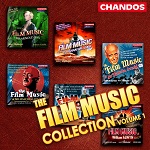
 The
performances are all in safe hands: mostly the BBC Philharmonic or BBC
Concert Orchestra and Rumon Gamba – Vassily Sinaisky in the Shostakovich,
Barry Wordsworth in Stanley Black – and recordings are excellent. Some
of the more recent albums come as 24-bit downloads but I’ve stayed with
the 16-bit as these are what is provided on USB. You can choose between
the original booklets and those included with the bundles.
The
performances are all in safe hands: mostly the BBC Philharmonic or BBC
Concert Orchestra and Rumon Gamba – Vassily Sinaisky in the Shostakovich,
Barry Wordsworth in Stanley Black – and recordings are excellent. Some
of the more recent albums come as 24-bit downloads but I’ve stayed with
the 16-bit as these are what is provided on USB. You can choose between
the original booklets and those included with the bundles.
I had access to some of the original Chandos USB releases but on this
occasion, having already downloaded and mentioned several of the film
music recordings on both bundles, I downloaded the remainder, effectively
creating my own USB. You will need at least a 4GB stick for the lossless
files and 8GB if you intend to add the 320kb/s mp3s: you should be able
to find these for less than £10.
Your computer should play the wma or flac files from each bundle without
trouble but you may need to drag and drop the mp3s onto your hard drive
to avoid gaps between tracks. Some of the older albums still number
the first tracks Tk1 to Tk9, which means that you may well find your
player inserting tracks 10-19 after track 1. In such cases you need
very carefully to renumber Tk1 as Tk01, etc. I presume – and
hope – that this has been done for purchasers of the USBs.
In some cases you may need to supplement what is included on these recordings:
the Korngold, for example, appends only a short 4-movement suite from
Robin Hood to The Sea Wolf on CHAN10336. For the
complete reconstructed score, you will need the new Naxos reissue of
a Marco Polo recording reviewed below. Also, for all the fine music
by Vaughan Williams on volumes 2 and 3, the music from Scott of the
Antarctic on volume 1 provides a fascinating comparison with the
Seventh Symphony, Antartica, which grew out of it (CHAN10007:
also included in a 3-for-2 set of all three volumes of the Chandos VW
Film Music CHAN10529).
There are some whole-composer gaps here, too, not least Richard Addinsell,
whose Warsaw Concerto and other film music is available on another
Rumon Gamba album, CHAN10046.
***
Argentum et Aurum: Musical Treasures from
the Early Habsburg Renaissance
 Ensemble
Leones (Els Janssens-Vanmunster (voice), Raitis Grigalis (voice), Baptiste
Romain (renaissance violin), Uri Smilansky (viola d’arco), Elizabeth
Rumsey (renaissance gamba), Miriam Andersén (Swedish cowhorn), Tobie
Miller (symphonie), Liane Ehlich (flute))/Marc Lewon (viola d’arco,
cetra and plectrum lute)
Ensemble
Leones (Els Janssens-Vanmunster (voice), Raitis Grigalis (voice), Baptiste
Romain (renaissance violin), Uri Smilansky (viola d’arco), Elizabeth
Rumsey (renaissance gamba), Miriam Andersén (Swedish cowhorn), Tobie
Miller (symphonie), Liane Ehlich (flute))/Marc Lewon (viola d’arco,
cetra and plectrum lute)
rec. Schlosskirche Beuggen, Germany, 9-12 April 2013. DDD
Texts and translations available online.
NAXOS 8.573346 [78:37]
For full details please see my review
of the CD: ‘As [with the ensemble’s earlier recording of Neidhart],
the present release combines detailed scholarship – all the source MSS
are listed in the notes – with very enjoyable performances and the recording
is very good.’
Sample/stream/download from Qobuz
or stream from Naxos Music Library.

Of the three available recordings of the Requiem by Jean RICHAFORT
(c.1480-after 1547) I have reviewed those on Hyperion – August
2012/1 – and Harmonia Mundi budget-price Musique d’Abord – review
– but seem to have missed the King’s Singers on Signum (SIGCD326
[58:22]) until I investigated their recording in connection with a review
of the Hyperion album of music by Jacquet or Jachet of Mantua (below)
one of whose works features in the Signum programme.
All the music here, including the Richafort Requiem, was composed
in honour of Josquin Desprez, two of whose own works also feature in
the programme. Dominy Clements compared the Signum with the Hyperion,
preferring the latter only by a very small margin – review.
I agree, but by an even smaller margin; the inclusion of Jacquet’s Dum
vastos Adriae fluctus and Josquin’s Salve regina, not on
the Hyperion, though that has the longer playing time, makes the Signum
especially valuable.
The 24-bit download from hyperion-records.co.uk
is excellent and, at £10.50, slightly less than you would expect to
pay for the CD and not much more than the mp3 and 16-bit (£6.99). All
formats come complete with the booklet containing the texts and translations.
Whatever you choose, don’t go for the iTunes download button: you’ll
end up paying more than £6.99 for a lower bit-rate and I doubt if you
will get the booklet.
Discovery of the Month
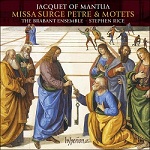 JACQUET
of Mantua (c.1483–1559) Missa Surge Petre and Motets
JACQUET
of Mantua (c.1483–1559) Missa Surge Petre and Motets
The Brabant Ensemble/Stephen Rice
rec. Church of St Michael and All Angels, Summertown, Oxford, 2014.
DDD
Booklet includes texts and translations
HYPERION CDA68088 [76:33] – from hyperion-records.co.uk
(mp3, 16- and 24-bit lossless, with pdf booklet)
For full details please see my review.
This is such a wonderful discovery that I expressed the hope in my full
review that The Brabant Ensemble and Hyperion will bring us more.
 Some
time ago Avi Avital recorded arrangements for mandolin and orchestra
(with the Kammerakademie Potsdam/Shalev Ad-El) or mandolin and continuo
of various concertos by Johann Sebastian BACH (1685-1750). Keyboard
concertos Nos. 1 and 5 work especially well, as most musicologists are
now convinced that these were Bach’s own transcriptions of earlier,
now lost, concertos for other instruments, but the whole programme is
enjoyable. (DG 4790092 – stream from Qobuz;
download from 7digital.com,
mp3, or prestoclassical.co.uk,
mp3 and lossless).
Some
time ago Avi Avital recorded arrangements for mandolin and orchestra
(with the Kammerakademie Potsdam/Shalev Ad-El) or mandolin and continuo
of various concertos by Johann Sebastian BACH (1685-1750). Keyboard
concertos Nos. 1 and 5 work especially well, as most musicologists are
now convinced that these were Bach’s own transcriptions of earlier,
now lost, concertos for other instruments, but the whole programme is
enjoyable. (DG 4790092 – stream from Qobuz;
download from 7digital.com,
mp3, or prestoclassical.co.uk,
mp3 and lossless).
 Now
Avital has done the same for Antonio VIVALDI (1678-1741), directing
the Venice Baroque Orchestra with even greater success: only one of
the concertos on this album was composed for the mandolin but you’d
hardly know it (DG 4794017). Stream from Qobuz;
download from 7digital,
mp3 and lossless, or prestoclassical.co.uk,
mp3, 16- and 24-bit lossless. Please see my
review for details.
Now
Avital has done the same for Antonio VIVALDI (1678-1741), directing
the Venice Baroque Orchestra with even greater success: only one of
the concertos on this album was composed for the mandolin but you’d
hardly know it (DG 4794017). Stream from Qobuz;
download from 7digital,
mp3 and lossless, or prestoclassical.co.uk,
mp3, 16- and 24-bit lossless. Please see my
review for details.
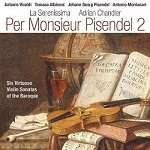 Per
Monsieur Pisendel 2
Per
Monsieur Pisendel 2
Sonatas by Antonio VIVALDI (1678-1741), Johann Georg PISENDEL (1687-1755),
Antonio MONTANARI (1676-1737) and Tomaso ALBINONI (1671-1751)
La Serenissima/Adrian Chandler – rec. 2014.
AVIE AV2308 [74:30] – sample/stream/download in lossless sound
from Qobuz
Scholarship and musicianship combine to make this an attractive successor
to Volume 1. Please see my review
for full details.
 The
Harmonia Mundi recordings of Johann Sebastian BACH (1685-1750)
Christmas Cantata, Christen ätzet diesen Tag, BWV63, and the
Christmas arrangement of his Magnificat in E-flat, BWV243a, performed
by Collegium Musicum Gent conducted by Philippe Herreweghe, have been
released in various formats since their first issue. They now appear
on the super-budget Musique D’Abord label in which form they have been
welcomed by Simon Thompson as Recording of the Month (HMA1951782
[61:25] – review).
It’s not the only contender in the Magnificat(1) but
I certainly wouldn’t mind having this album on my Desert Island and
not just at Christmas.
The
Harmonia Mundi recordings of Johann Sebastian BACH (1685-1750)
Christmas Cantata, Christen ätzet diesen Tag, BWV63, and the
Christmas arrangement of his Magnificat in E-flat, BWV243a, performed
by Collegium Musicum Gent conducted by Philippe Herreweghe, have been
released in various formats since their first issue. They now appear
on the super-budget Musique D’Abord label in which form they have been
welcomed by Simon Thompson as Recording of the Month (HMA1951782
[61:25] – review).
It’s not the only contender in the Magnificat(1) but
I certainly wouldn’t mind having this album on my Desert Island and
not just at Christmas.
The least expensive download comes at £4.29(2), in lossless
sound, from Qobuz, where subscribers can also stream the music. There
is no booklet but I understand that there’s no libretto even with the
CD – Harmonia Mundi are rather stingy in that respect when other budget-price
labels are more generous – though the texts are easily available online.
No recording details are given but these two works were first released
as part of a 2-CD set, with two other Christmas cantatas, in late 2003.
(HMC1781/82, download only).
(1) If you took my advice and bought the Decca Baroque
Era set or Volume 2 of that set as a download, you will find Emma
Kirkby and others in a fine performance of the Christmas version of
the Magnificat as part of that collection. It’s still available
for £11.56 from Qobuz,
where it can also be streamed/sampled: good value for the equivalent
of 25 CDs.
(2) Eclassical’s per-second charging policy, usually a guarantee
of a competitive price, rules them out for this and most other budget-price
releases, in this case at $13.82. Though that’s not much more than you
might pay from some dealers for the CD, shop around and you should be
able to find the disc for around £6.50 or less.
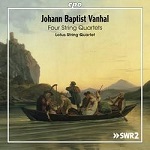
Jan Krtitel VAŇHAL (Johann Baptist WANHAL) (1739-1813) was
a member of a Viennese quartet that I would have dearly loved to hear:
the other players were Haydn, Mozart and Dittersdorf. I don’t know if
they performed any of his own string quartets but CPO have just released
an enjoyable recording of four of them, well performed by The Lotus
Quartet (7774752).
Jonathan Woolf liked these performances and recording – review
– and the download from eclassical.com,
which comes in mp3 and lossless, also contains the pdf booklet which
JW singled out for praise. With no rivals in the catalogue, this well-filled
album [78:11] is well worth investigating – sample from Qobuz.
Hector BERLIOZ (1803-1869)
Intrata di Rob-Roy MacGregor (1831) [13:16]
Rêverie et Caprice, Op.8 (1841) [8:07]
Harold in Italy, Op.16 (1834) [42:16]
James Ehnes (violin/viola)
Melbourne Symphony Orchestra/Sir Andrew Davis
rec. 2014, Hamer Hall, Arts Centre, Melbourne, Australia. DDD
CHANDOS CHAN5155 [64:00] - from theclassicalshop.net
(mp3, 16- and 24-bit lossless with pdf booklet). Also available as SACD
CHSA5155.
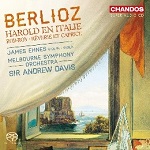 Ralph
Moore thought this Harold in Italy correct and unobjectionable
but unidiomatic – review.
I was equally disappointed by the recent LSO Live recording conducted
by Valery Gergiev – review.
Ralph
Moore thought this Harold in Italy correct and unobjectionable
but unidiomatic – review.
I was equally disappointed by the recent LSO Live recording conducted
by Valery Gergiev – review.
There are some uncanny pre-echoes of Harold in Italy in the Rob
Roy music, mingled with shades of Bruch’s Scottish Fantasia,
but the charm soon wears off and the material was better used three
years later in its more familiar place. I liked this recording of Harold
better than the Gergiev but didn’t engage with it as I had hoped, so
my faith in older recordings is unshaken – the vintage Beecham, if you
can find it, and Colin Davis (EMI – sample/steam/download for £5.97
from Qobuz
– or LSO Live).
The recording is good, especially in 24/96. I also sampled the 16/44.1
– slightly inferior to the 24-bit, as compared, but still doing justice
to the music. Both benefit from a volume boost.
Anton BRUCKNER (1824-1896) Symphony
No. 7 in E, WAB107 (1881-1883)
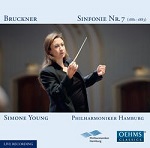 Of
the many recordings of this symphony listed in our Masterwork Index
I was impressed by David Runnicles with the BBCSSO (Hyperion CDA67916
–
review) and so was John Quinn – review.
I also like Herbert von Karajan (DG Karajan Gold, with VPO) and Marek
Janowski (PentaTone) and there’s a highly regarded earlier Oehms recording
with Stanislaw Skrowaczewski at the helm.
Of
the many recordings of this symphony listed in our Masterwork Index
I was impressed by David Runnicles with the BBCSSO (Hyperion CDA67916
–
review) and so was John Quinn – review.
I also like Herbert von Karajan (DG Karajan Gold, with VPO) and Marek
Janowski (PentaTone) and there’s a highly regarded earlier Oehms recording
with Stanislaw Skrowaczewski at the helm.
The latest recording in the series of live recordings of the Bruckner
symphonies from Simone Young and the Hamburg Philharmonic impressed
both Dave Billinge and John Quinn (Oehms OC688 – reviews).
When one of my colleagues is impressed I like to follow up, but when
two offer praise, doubly so. Those who think Runnicles a mite too fast
– I didn’t – should find Young’s timings ideal – 66:29 overall – very
close to Karajan and Janowski. Now I have at least four versions to
choose from and I haven’t even mentioned Eugen Jochum (DG, no longer
available on CD), whose very different Bruckner I also like.
It’s available for download from eclassical.com
in mp3 and lossless sound, with pdf booklet. There’s no 24-bit – for
that you need the SACD – but the 16-bit sounds very good. This album
had not yet reached Qobuz when I checked but the other volumes are there
for sampling only, and it should be, too, in due course.

The Hungarian Connection
Johannes BRAHMS (1833-1897)
Clarinet Quintet in b minor, Op.115 [39:50] and other music
Andreas Ottensamer (clarinet) and friends – rec. 2014
DEUTSCHE GRAMMOPHON 4811409 [61:30] – sample/stream/download
from Qobuz
(16- and 24-bit lossless) or download from 7digital.com (mp3 for £8.49
- NB their 16- and 24-bit offerings are more expensive than Qobuz).
For details please see my review
– Recording of the Month – and review by Stephen
Barber.
France - Espagne
Emmanuel CHABRIER (1841-1894)
España, rhapsodie pour orchestre 91883) [6:18]
Jules MASSENET (1842-1912)
Le Cid – suite de ballet [17:14]
Maurice RAVEL (1875-1937)
Miroirs: Alborada del gracioso (1904-1905) [7:57]
Claude DEBUSSY (1862-1918)
Images pour orchestre: Ibéria (1905-1906) [20:14]
Les Siècles/François-Xavier Roth
rec. live, 24 August 2012, venue unknown
No booklet
MUSICALES ACTES SUD ASM17 [53:03] – from eClassical.com
(mp3, 16-bit lossless)
 Roth
and his period musicians offer refreshing takes on well-established
repertoire; here the focus is on Spain, filtered through a French lens.
I reviewed
their Rite of Spring and Petrushka on the main site and
found much to enjoy there. It’s music that’s inextricably linked to
Ernest Ansermet, as indeed is Chabrier’s; the latter’s fabled Decca/OSR
recording of España takes some beating, but Roth and his band
give a superbly articulated and highly spirited account of the piece.
Not Ansermet, but very satisfying nonetheless.
Roth
and his period musicians offer refreshing takes on well-established
repertoire; here the focus is on Spain, filtered through a French lens.
I reviewed
their Rite of Spring and Petrushka on the main site and
found much to enjoy there. It’s music that’s inextricably linked to
Ernest Ansermet, as indeed is Chabrier’s; the latter’s fabled Decca/OSR
recording of España takes some beating, but Roth and his band
give a superbly articulated and highly spirited account of the piece.
Not Ansermet, but very satisfying nonetheless.
That rhythmic verve is carried over into the suite from Massenet’s opera
Le Cid. The bright, clean recording is lively without being fatiguing,
but the bass is rather diffuse at times. Performance-wise the suite
is enjoyable enough – the Madrilène is meltingly done – but otherwise
this is a decent performance rather than an outstanding one.
The Ravel is nicely inflected, if a little short on atmosphere; not
only that, Roth’s dynamic contrasts are a little too emphatic for my
tastes. As for Roth’s Ibéria, it’s nimble but rather cool. Indeed,
these strike me as crisp, clear-eyed performances rather than soft-grained,
sense-stroking ones. There is applause, too.
Intermittently enjoyable; clearly this label didn’t get the memo about
supplying booklets with their downloads.
Dan Morgan
(Though I have enjoyed the releases in this series so far, I was less
excited about this new album: España could have gone with more
of a swing and there are more evocative performances of Images
to be had, but if the programme appeals this is an attractive enough
album, well recorded. Those daunted by applause should note that it
features at the end of each work. Eclassical’s per-second charging
policy compensates for the short playing time but the lack of a booklet,
from there or Qobuz or any supplier that I could find is a serious nuisance.
BW)
 I
missed Chandos’s recent recording of Jules MASSENET’s (1842-1912)
music conducted by Neeme Järvi (CHSA5137: Recording of
the Month – review),
which means that I don’t think that I’ve listened to Le Cid since
I had the Martinon recording on LP (now Eloquence 4762742).
I reacquainted myself with that version from Qobuz and it still sounds
fresh but the Chandos has the edge in that it comes as an SACD or in
24-bit format. The 24-bit is very good; even in 16-bit format it sounds
very well and the performances are every bit as good as that Recording
of the Month accolade suggests. Even if The Last Sleep of the Virgin
cannot quite match Beecham’s classic account, Truls Mørk (cello) and
the Orchestre de la Suisse Romande come as close as could be imagined.
I
missed Chandos’s recent recording of Jules MASSENET’s (1842-1912)
music conducted by Neeme Järvi (CHSA5137: Recording of
the Month – review),
which means that I don’t think that I’ve listened to Le Cid since
I had the Martinon recording on LP (now Eloquence 4762742).
I reacquainted myself with that version from Qobuz and it still sounds
fresh but the Chandos has the edge in that it comes as an SACD or in
24-bit format. The 24-bit is very good; even in 16-bit format it sounds
very well and the performances are every bit as good as that Recording
of the Month accolade suggests. Even if The Last Sleep of the Virgin
cannot quite match Beecham’s classic account, Truls Mørk (cello) and
the Orchestre de la Suisse Romande come as close as could be imagined.
Theclassicalshop.net
offer the Chandos recording in mp3, 16- and 24-bit lossless, and eclassical.com
also have it in mp3 and 16-bit lossless. Both include the pdf booklet.
Theclassicalshop.net’s price for mp3 is the more attractive but eclassical.com
work out slightly less expensive for 16-bit lossless at current $/£
exchange rates.
Leoš JANÁČEK (1854-1928)
Jealousy, JW VI/10 (1895) [5:30]
Violin Concerto ‘The Wandering of a Little Soul’, JWIX/10 (c. 1926,
completed by Leoš Faltus and Miloš Štedron, 1988) [12:05]
The Ballad of Blaník, JW VI/16 (1919) [7:43]
The Fiddler's Child, JW VI/14 (1913) [12:48]
The Danube, JW IX/7 (Unfinished symphony 1923-1925, completed
by Leoš Faltus and Miloš Štedron, 1985) [16:10]
Taras Bulba, JW/VI/15 (1915-1918) [22:51]
James Ehnes (violin, Concerto)
Melina Mandozzi (violin, The Fiddler's Child)
Susanna Andersson (soprano, The Danube)
Bergen Philharmonic Orchestra/Edward Gardner
rec. 2014, Grieghallen, Bergen, Norway
Pdf booklet included
CHANDOS CHAN5156 [77:48] – from theclassicalshop.net
(mp3, 16-bit & 24/96 Studio Master stereo/surround) Also availabnle
on SACD as CHSA5156
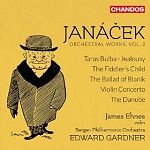 Anyone
with even a passing interest in Janáček’s music will know that
the late Sir Charles Mackerras had a special affinity for this composer;
indeed, he’s usually the one others have to usurp. That said, the first
volume in Edward Gardner’s ongoing Janáček series was warmly received
by John
Quinn. Besides, the Bergen Philharmonic are in terrific form at
the moment, as I discovered when I reviewed
Andrew Litton’s Prokofiev Fifth Symphony and Scythian Suite.
Anyone
with even a passing interest in Janáček’s music will know that
the late Sir Charles Mackerras had a special affinity for this composer;
indeed, he’s usually the one others have to usurp. That said, the first
volume in Edward Gardner’s ongoing Janáček series was warmly received
by John
Quinn. Besides, the Bergen Philharmonic are in terrific form at
the moment, as I discovered when I reviewed
Andrew Litton’s Prokofiev Fifth Symphony and Scythian Suite.
I started with Taras Bulba, a surging, red-blooded piece that
Mackerras and the Wiener Philharmoniker did so well for Decca in the
early days of digital. Within seconds it’s clear that Gardner lacks
the sheer drama that make Sir Charles’s account so exhilarating. In
fact there’s very little sense of a strong narrative here, and Gardner’s
rather deliberate tread robs the music of its cumulative energy and
excitement. And although the Grieg Hall’s electronic organ has plenty
of heft in the work’s closing bars the recording – like the performance
– could do with a bit more spike. Frankly it all sounds rather anaemic
alongside the Mackerras/Decca version.
The shorter pieces are a tad disappointing as well. Jealousy,
originally intended as the overture to Janáček’s opera Jenufa,
gets a decent outing. The recording is much more immediate this tome
round and that helps to intensify colours and sharpen contrasts. James
Ehnes gives a lithe performance of the short Violin Concerto, whose
dark, burbling accompaniment is well caught by the Chandos team. I just
wish Gardner sounded moreinteresting; alas, I’m beginning to
think his Janáček is efficient rather than idiomatic. That doesn’t
bode well for his upcoming Glagolitic Mass.
Gardner does let off the brakes a bit in The Ballad of Blanik,
which has a strong pulse and a welcome sense of air; in spite of that
I simply cannot not engage with this performance. Still, the sound has
plenty of detail, especially in The Fiddler's Child. Violinist
Melina Mandozzi has a pleasing tone and fine articulation, while and
soprano Susanna Andersson sings a decent vocalise in Janáček’s
unfinished symphony, The Danube. As with the Violin Concerto
– also a completion – I’m less than convinced that the piece has that
instantly recognisable Janáček ‘sound’.
Some interesting rarities, but otherwise pretty ordinary; Mackerras’s
crown is safe.
Dan Morgan
(I’ve had chance for only a brief run through of this recording so far,
though I find myself agreeing with Dan that Taras Bulba needs
more power: this is a work that needs energy, which is also lacking
in a disappointing Naxos performance coupled with an equally under-powered
Sinfonietta which inexplicably maintained 3-star status for years
in the Penguin Guide. BW)

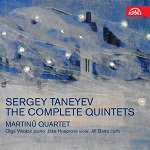 We
now have two complete 2-CD recordings of Sergey TANEYEV (1856-1915)
Complete Quintets – from the eponymous Taneyev Quartet and others on
Northern Flowers NFPMA9944/45 – review
– and a more recent competitor from the Martinu Quartet et al
on Supraphon SU41762 [124:36]. Both offer a fine introduction
to the attractive chamber music of a composer who is not exactly over-represented
in the catalogue. The Northern Flowers is ADD, the Supraphon a more
recent DDD, but both sound very well.
We
now have two complete 2-CD recordings of Sergey TANEYEV (1856-1915)
Complete Quintets – from the eponymous Taneyev Quartet and others on
Northern Flowers NFPMA9944/45 – review
– and a more recent competitor from the Martinu Quartet et al
on Supraphon SU41762 [124:36]. Both offer a fine introduction
to the attractive chamber music of a composer who is not exactly over-represented
in the catalogue. The Northern Flowers is ADD, the Supraphon a more
recent DDD, but both sound very well.
The Northern Flowers recording can be obtained from eclassical.com (mp3
and lossless) and Qobuz but, while I would recommend sampling from the
latter, neither comes with the booklet which is obtainable with the
CDs from MusicWeb-International
for £19.75, post-paid worldwide.
The Supraphon can be downloaded from emusic.com
in 320 kb/s mp3 for £4.62. If you must have lossless sound, that’s
available for streaming or purchase from Qobuz.
There’s no booklet with the Supraphon, but I understand that it isn’t
very informative anyway.
If you prefer just to dip a toe into the water, there’s a recording
of the Piano Quintet, with Arensky’s Piano Quintet on Hyperion which
Stephen Greenbank thought a winner (CDA67695 Piers Lane and the
Goldner Quartet –
review). Download from hyperion-records.co.uk,
mp3, 16- and 24-bit lossless, with pdf booklet. John Quinn made a recording
of the Piano Trio, Piano Quartet and Piano Quintet Recording
of the Month (CPO 777793-2). £4.62 from emusic.com
(mp3): sample/stream/download from Qobuz
(no booklet from either).
Ralph VAUGHAN WILLIAMS (1872–1958) Dona nobis pacem (1936)*
[34:29]
Stephen HOUGH (b.1961) Missa Mirabilis (2006/2012) [20:13]
Sarah Fox (soprano)*; Christopher Maltman (baritone)*
Colorado Symphony Chorus; Colorado Symphony/Andrew Litton
rec. Boettcher Concert Hall, Denver, Colorado, USA, 26-30 March 2014.
DDD
pdf with texts and translations included
HYPERION CDA68096 [54:42] - from hyperion-records.co.uk
(CD, mp3 16- and 24-bit lossless.)

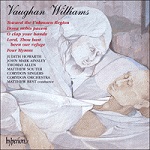 Please
see review
by John Quinn and look out for my own forthcoming full review on the
main MusicWeb-International pages.
Please
see review
by John Quinn and look out for my own forthcoming full review on the
main MusicWeb-International pages.
JQ mentions an earlier Hyperion recording of Dona Nobis Pacem
and he has urged me to try this, too: Sir Thomas Allen (baritone) and
Judith Howarth (soprano) with the Corydon Singers and Orchestra/ Matthew
Best, coupled with Toward the Unknown Region, Four Hymns
and other shorter works on CDA66655
[76:22]. That recording is also available as part of an attractively
priced 4-CD set of VW’s Choral Works on CDS44321/4
– review
– review
– which also includes other recordings that I have reviewed and enjoyed
separately. Even if you already have one CD from this set, the price
of around £20.50 (£20 for download) makes it well worth obtaining.
The two works associated with Pilgrim’s Progress, the incidental
music and The Shepherds of the Delectable Mountains, and the
Mystical Songs are worth the price alone.
There is no 24-bit version, but the 16-bit is not far behind the new
recording in sound quality and the performance of Dona Nobis
really is all that JQ claims, not least for the contribution of Thomas
Allen, whose contribution to the Mystical Songs is another strong
reason for obtaining the 4-CD set or at least the single-CD version
on mid-price CDA30025 – DL
Roundup October 2010.
My benchmark for Toward the Unknown Region remains the Boult
recording, also coupled with Dona Nobis Pacem and other works,
now immured in a 13-CD set – review
– but the EMI British Composers 2-CD set – Bargain
of the Month – is still available to sample/stream/download
from Qobuz.
I’ve always felt that Boult didn’t come to life until about half way
through this work and for that reason it’s not music that I have often
listened to but the Hyperion recording engaged my attention much more.
Maurice RAVEL (1875-1937)
Daphnis et Chloé (complete ballet) (1909–12) [56:52]
Pavane pour une Infante défunte (1899, orch. 1910) [6:30]
Netherlands Radio Choir
Rotterdam Philharmonic Orchestra/Yannick Nézet-Séguin
rec. De Doelen Hall, Rotterdam, The Netherlands, June 2012 (Daphnis
et Chloé) and March 2014 (Pavane). DDD
BIS BIS-SACD-1850 [63:27] - from eclassical.com
(mp3 16- and 24-bit lossless, all with pdf booklet)
 Please
see review
by Brian Reinhart and myself.
Please
see review
by Brian Reinhart and myself.
I liked this, perhaps for the very reason that gave Brian Reinhart reservations
– Nézet-Séguin’s somewhat non-interventionist direction, which brings
it for me close to challenging the classic LSO/Monteux (Decca, still
my benchmark). My own reservations, which BR seems not to share, concern
the volume level – turn it up to avoid the ppp passages sounding
de-natured and the climaxes are far too loud, and there are plenty of
very soft and loud passages in this work.

In terms of value for money Otakar OSTRČIL (1879-1935) Calvary:
Variations for large Orchestra, Op.24 should be Bargain of the Month
– the Czech Philharmonic conducted by Václav Neumann. It comes complete
on one track [31:25] from Supraphon, £0.42 from emusic.com.
I’m pleased to see that it’s one of their recent releases at the full
320kb/s bit-rate, though that cannot disguise the thinness of the sound,
which is disappointing for a recording first released in the UK as recently
as 1981.
In theory this is lush late-romantic music that I should have enjoyed
– think of early Schoenberg, such as Pelleas and Melisande –
but it didn’t quite gel for me. You may wish to sample first from Qobuz:
they also have the same recording coupled with Suk’s Symphony No.1.
Hungarian Cello Concertos
Mátyás SEIBER (1905-1960)
Tre Pezzi for cello and orchestra (1956) (premiere recording)
[19:57]
Antal DORATI (1906-1988)
Concerto for cello and orchestra (1977) [33:42]
Béla BARTÓK (1881-1945)
Viola Concerto, BB128, Sz.120 (1945) (adapted for cello by Tibor Serly,
ed. Peter Bartók and Nelson Dellamaggiore, 1993/2003) [23:49]
Raphael Wallfisch (cello)
BBC National Orchestra of Wales/Gábor Tákacs-Nagy
 rec.
Hoddinott Hall, Cardiff, 2014. DDD
rec.
Hoddinott Hall, Cardiff, 2014. DDD
NIMBUS NI5919 [77:28] – sample/stream/download from Qobuz
(no booklet) or purchase CD from MusicWeb-International.
This recording continued the process of coming to terms with Mátyás
Seiber’s music which I had previously side-lined. The recent Lyrita
recording of his two Joyce settings, Ulysses and the Three
Fragments from The Portrait of the Artist, with the Elegy for
viola and small orchestra started the process of rehabilitation: SRCD.348:
Recording of the Month – review.
I enjoyed the Nimbus recording especially for the Seiber; the other
works come as a welcome bonus and I see that Jonathan Woolf also reacted
positively – his review
and mine were published together, though not a collaborative effort.
Discovery of the Month
Bohuslav MARTINŮ (1890-1959)
Concerto for two pianos and orchestra, H.292 (1943) [24:27]
Igor STRAVINSKY (1882-1971)
Sonata for two pianos (1942/44) [10:29]
Dmitri SHOSTAKOVICH (1906-1975)
Concertino in A minor for two pianos, Op. 94 (1953) [9:10]
Francis POULENC (1899-1963)
Concerto in D minor for two pianos and orchestra, FF61 (1932) [19:36]
Bizjak Piano Duo (Sanja Bizjak, Lidija Bizjak)
Stuttgarter Philharmoniker/Radoslaw Szulc
rec. 2014, Gustav-Siegle-Haus, Stuttgart, Germany
No booklet
ONYX 4148 [63:49] – from eClassical.com
(mp3, 16- and 24-bit lossless)
 This
is one of my Innocent Ear reviews; all the works here, with the exception
of the Shostakovich, are new to me, as are the performers. Michael Cookson
welcomed the CD release, concluding that the Bizjak sisters are on ‘blistering
form’ (review).
The Martinů is certainly virtuosic, but these players are very
much in control of their material. The quieter moments – and there are
more of them than you might expect – are crystal clear and the climaxes
are impressive rather than overbearing. The piano sound is well caught,
although the orchestra seems a tad diffuse at times.
This
is one of my Innocent Ear reviews; all the works here, with the exception
of the Shostakovich, are new to me, as are the performers. Michael Cookson
welcomed the CD release, concluding that the Bizjak sisters are on ‘blistering
form’ (review).
The Martinů is certainly virtuosic, but these players are very
much in control of their material. The quieter moments – and there are
more of them than you might expect – are crystal clear and the climaxes
are impressive rather than overbearing. The piano sound is well caught,
although the orchestra seems a tad diffuse at times.
That same crystalline quality comes through in the Stravinsky sonata,
which has terrific point and sparkle. Phrasing, rhythms and dynamics
are beautifully managed, and the middle movement has an unaffected air
that I like very much indeed. That’s carried through to the short final
movement. This is the kind of piece that can seem a little dry, but
there’s absolutely no sense of desiccation here, impending or otherwise.
As for the single-movement Shostakovich Concertino the Bizjaks
invest it with plenty of wit and warmth. Delightful music, winningly
played.
The quirky Poulenc concerto is a treat, too. Conductor Radoslaw Szulc
and his Stuttgarters are the perfect accompanists, for they mirror the
pianists when it comes to buoyancy and, in the central movement, an
element of grace. Balances are just fine and there’s no hardness in
the treble. But it’s the playing of these sisters that deserves the
most praise; sensitive, stylish and always interesting they’re definitely
a duo to watch.
A terrific programme, well played and recorded; no booklet, though.
Dan Morgan
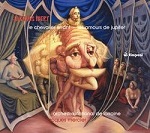
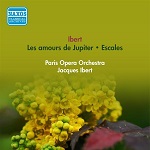 Jacques
IBERT’s (1890-1962) Divertissement is one of the craziest
and most enjoyable pieces of music ever written, not least because it
mocks the avant-garde, making the listener think some neo-Stockhausen
is afoot before launching into Knees up Mother Brown territory.
A piece of music on the subject of Cervantes knight-errant, not actually
named in the title, Le Chevalier Errant, but none other than
Don Quixote, should also be fun, especially when the recording is rounded
off with his Les Amours de Jupiter, outlining that naughty deity’s
philandering with Europa, Leda, Danaë and Ganymede. The performances
are by the Orchestre National de Lorraine conducted by Jacques Mercier
(Timpani 1C1230 [57:24], download only, from eclassical.com,
mp3, 16- and 24-bit lossless or sample/stream from Qobuz,
both with pdf booklet).
Jacques
IBERT’s (1890-1962) Divertissement is one of the craziest
and most enjoyable pieces of music ever written, not least because it
mocks the avant-garde, making the listener think some neo-Stockhausen
is afoot before launching into Knees up Mother Brown territory.
A piece of music on the subject of Cervantes knight-errant, not actually
named in the title, Le Chevalier Errant, but none other than
Don Quixote, should also be fun, especially when the recording is rounded
off with his Les Amours de Jupiter, outlining that naughty deity’s
philandering with Europa, Leda, Danaë and Ganymede. The performances
are by the Orchestre National de Lorraine conducted by Jacques Mercier
(Timpani 1C1230 [57:24], download only, from eclassical.com,
mp3, 16- and 24-bit lossless or sample/stream from Qobuz,
both with pdf booklet).
These two ballets are not as much fun as Divertissement, but
they are enjoyable. There’s just one other recording of Le Chevalier,
also download only, and the only other version of Les Amours
that I could find is a 1954 or 1956 French EMI recording made with Ibert
himself at the helm of the Paris Opéra Orchestra on a Naxos Classical
Archives download, available for just £1.68 from
emusic.com. (9.80405, with Escales). For its age, and considering
that it’s transferred at a low bit-rate not much higher than a measly
150kb/s, it doesn’t sound too bad and it’s nice to have the composer’s
own recording, even if the ensemble is not always ideal.
Sir Arthur BLISS (1891-1975)
Madame Noy - A Witchery Song for soprano and instrumental ensemble
(1918) [3:44]
Rout, for soprano and chamber ensemble (1920) [6:52]
Jennifer Vyvyan (soprano)/Wigmore Ensemble
rec. 11 March 1958
The Enchantress - scena for contralto and orchestra (1951) [16:59]
Pamela Bowden (contralto); BBC Symphony Orchestra/Rudolf Schwarz
rec. 21 April 1957
The Beatitudes (1961) [48:18]
Heather Harper (soprano); Gerald English (tenor); Goldsmiths Choral
Union; Royal Choral Society; Wembley Philharmonic Society; BBC Chorus;
BBC Symphony Orchestra/Sir Arthur Bliss
rec. 31 August 1964, Royal Albert Hall, London
LYRITA ITTER BROADCAST COLLECTION REAM1115 [75:53]
 See
reviews by John
Quinn and Nick
Barnard.
See
reviews by John
Quinn and Nick
Barnard.
My two colleagues have already used up all the superlatives, so I can
only endorse them. The settings of George Herbert within The Beatitudes
make a fascinating comparison with the same poems in Vaughan Williams’
Five Mystical Songs.
Unfortunately the only worthwhile(1) download that I have
been able to locate – sample/stream/download in lossless sound from
Qobuz
– is devoid of the texts. The streamed version even manages to get
the provenance mixed up, mis-ascribing The Enchantress to ‘Wigmore
Ensemble’. By the time that you read this, Naxos Music Library may
have added this album to their collection and included the booklet.
(1) I discount the Amazon and iTunes versions – mp3 at a
less than ideal bit-rate for the same price that Qobuz charge for lossless,
with 320kb/s mp3 thrown in by the latter if you wish.
Rediscovery of the Month
Erich Wolfgang KORNGOLD (1897–1957)
Lieder des Abschieds, Op. 14 (1920 -1921) [16:16]
Symphony in F sharp, Op. 40 (1947-1952) [51:33]
Linda Finnie (contralto)
BBC Philharmonic/Sir Edward Downes
rec. 14-15 December 1992, Studio 7, New Broadcasting House, Manchester,
UK
Pdf booklet included
CHANDOS CHAN10431 X [68:02] – from eClassical.com
(mp3, 16- & 24-bit lossless)
 During
the recent Record Store Day I heard many collectors lament the demise
of favourite outlets where they could browse through all the music on
offer. I share that sense of loss, but I’ve found that trawling download
sites can be just as rewarding. It was on one of those midnight missions
that I discovered these 24/96 flacs of a truly memorable disc I bought
when it first appeared more than 20 years ago. Rather curiously The
Download Shop only has the mp3 and 16-bit files, but both eClassical
and Qobuz have the higher-res ones (24/44.1).
During
the recent Record Store Day I heard many collectors lament the demise
of favourite outlets where they could browse through all the music on
offer. I share that sense of loss, but I’ve found that trawling download
sites can be just as rewarding. It was on one of those midnight missions
that I discovered these 24/96 flacs of a truly memorable disc I bought
when it first appeared more than 20 years ago. Rather curiously The
Download Shop only has the mp3 and 16-bit files, but both eClassical
and Qobuz have the higher-res ones (24/44.1).
It didn’t take long before I was utterly seduced by Linda Finnie’s warmly
expressive rendition of the Lieder des Abschieds. She’s steady,
glowing, gorgeous – and that applies to the playing of the BBC Phil
as well. Even more impressive is the quality of this recording; it’s
vintage Chandos, combining as it does refulgence with loving attention
to detail. I really do prefer the acoustics of the now-lost Studio 7,
New Broadcasting House – where these and so many other fine recordings
were made – to the less immediate and immersive sound I associate with
MediaCity. I often wonder if the musicians feel the same way.
Downes’s crisp, well-argued take on the symphony is every bit as impressive.
He digs deep and delivers what he finds with uncommon authority. What
a fine conductor he was, and how much he is missed. The work’s 51 minutes
pass swiftly, such is the level of variety and interest in this reading.
The orchestra, my favourite of the BBC’s many fine bands, play with
great feeling throughout; as for the recording, it’s both vivid and
weighty. Indeed, I’d be tempted to say this was Chandos at their very
best, which makes this coupling as fitting a tribute as any to the company’s
founder, Brian Couzens, who died last month (April 2015).
Radiantly sung and authoritatively played; a Korngold classic.
Dan Morgan
Erich Wolfgang KORNGOLD (1897-1957)
The Adventures of Robin Hood (1938)
Score restorations by John Morgan
Moscow Symphony Orchestra/William Stromberg
rec. February 2003, Mosfilm Studio, Moscow, Russia
Pdf booklet included
NAXOS 8.573369 [78:27] – from eClassical.com
(mp3, 16- and 24-bit lossless)
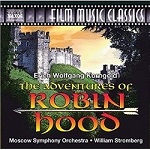 Having
much enjoyed the Stromberg/Moscow Symphony recording of Korngold’s Sea
Hawk I was keen to hear this one. Rob Barnett and Ian Lace’s enthusiastic
double review
of the original Marco Polo CD whetted my appetite even more. So, imagine
my disappointment when this 24/48 download turned out to be the sonic
equivalent of a turkey. It’s all the more galling as the playing is
very good indeed.
Having
much enjoyed the Stromberg/Moscow Symphony recording of Korngold’s Sea
Hawk I was keen to hear this one. Rob Barnett and Ian Lace’s enthusiastic
double review
of the original Marco Polo CD whetted my appetite even more. So, imagine
my disappointment when this 24/48 download turned out to be the sonic
equivalent of a turkey. It’s all the more galling as the playing is
very good indeed.
This has been released on DVD-A, and I’m reliably informed the multichannel
mix on that is excellent, if a little dry. Minutes into this new download
and it’s clear there’s something amiss. The sound has a curious ‘tunnelled’
quality, as if one were listening to ersatz stereo. There’s almost no
ambient information, and that results in a flat, desiccated sound. I’m
tempted to think this download is derived from the surround mix of that
DVD-A, sans the rear channels. Whatever the story this is not
a pleasant listen.
A flawed release; caveat emptor.
Dan Morgan
(I listened to the 16-bit lossless download from Qobuz
– review
– and was equally enthusiastic about the music and performances but
I also found the recording much more amenable than seems to be the case
with the 24-bit. The moral appears to be to go for the 16-bit Qobuz
or the CD, either of which is much less expensive than the 24-bit.
BW)
Horizon 2 – A Tribute to Oliver Messiaen
Paul DUKAS (1865-1935)
La plainte, au loin, du faune… (1920; orch. Geert van Keulen,
2007) [5:05]
Olivier MESSIAEN (1908-1992)
Les offrandes oubliées (1930) [11:23]
Marc-André DALBAVIE (b. 1961)
La source d’un regard (2007) [16:17]
Olivier MESSIAEN
Chronochromie (1959-1960) [22:45]
Rob ZUIDAM (b. 1964)
Adam-Interludes (2007-2008)
Royal Concertgebouw Orchestra/George Benjamin, Ingo Metzmacher (Zuidam)
rec. live, Concertgebouw, Amsterdam, 2007/2008
Pdf booklet enclosed
RCO LIVE RCO 09003 [71:55] – from eClassical.com
(mp3, 16- & 24-bit lossless)
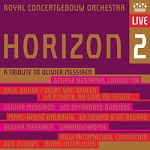 On
the main site I recently reviewed a marvellous album entitled Brass
Too, which showcases the Concertgebouw’s brass and percussion
sections. It’s proof – if it were needed – that this is one of the world’s
most versatile orchestras. Horizon 2, one of an ongoing series of live
concerts devoted to contemporary repertoire, celebrates the music of
Olivier Messiaen. It contains very good performances of Les offrandes
oubliées and Chronochromie, conducted by George Benjamin
and presented in sound of great sophistication. Geert van Keulen’s Dukas
orchestration is highly atmospheric, the Dalbavie piece has thrilling
weight and impact and Zuidam’s Adam-Interludes alternates between
fierce declamation and fragments of diaphanous beauty.
On
the main site I recently reviewed a marvellous album entitled Brass
Too, which showcases the Concertgebouw’s brass and percussion
sections. It’s proof – if it were needed – that this is one of the world’s
most versatile orchestras. Horizon 2, one of an ongoing series of live
concerts devoted to contemporary repertoire, celebrates the music of
Olivier Messiaen. It contains very good performances of Les offrandes
oubliées and Chronochromie, conducted by George Benjamin
and presented in sound of great sophistication. Geert van Keulen’s Dukas
orchestration is highly atmospheric, the Dalbavie piece has thrilling
weight and impact and Zuidam’s Adam-Interludes alternates between
fierce declamation and fragments of diaphanous beauty.
The Messiaen performances are certainly worth hearing, even if these
aren’t stand-out versions of either work. I regret that Ingo Metzmacher’s
contribution is restricted to the Zuidam piece, for he’s proved himself
a very fine Messiaen conductor (review).The
real attraction, though, is hearing the Concertgebouw in all its glory.
Invigorating repertoire, superbly played; another top-notch recording
from the Polyhymnia team.
Dan Morgan
Geoffrey BUSH (1920-1998)
Concerto for Light Orchestra (1958) [16:56]
Natus est Immanuel – A Christmas Piece for String Orchestra
(1939) [6:08]
Matthew Locke Suite Psyche – in collaboration with
Francis Harvey (c.1958) [6:18]
Sinfonietta Concertante for Cello and Small Orchestra (1943)
[17:10]
Two Miniatures for String Orchestra (1948) [6:56]
Finale for a Concert (1964) [4:46]
John IRELAND (1879-1962)
The Holy Boy (1915) (arr. cello and strings by Christopher
Palmer) [2:56]
Raphael Wallfisch (cello)
Northern Chamber Orchestra/Nicholas Ward
rec. St. Philip’s Church, Salford, Greater Manchester, UK, 2013
LYRITA SRCD.341 [61:10] – sample/stream/download in
lossless sound from Qobuz

 Please
see reviews by Nick
Barnard – ‘Another exemplary new Lyrita release featuring all the
label’s old virtues; fascinating and worthwhile repertoire performed
superbly, backed up by excellent technical and production values’ –
and Jonathan
Woolf – ‘With some vivid playing and recording, and well researched
notes, this fills a welcome gap in Bush’s representation on disc’.
Please
see reviews by Nick
Barnard – ‘Another exemplary new Lyrita release featuring all the
label’s old virtues; fascinating and worthwhile repertoire performed
superbly, backed up by excellent technical and production values’ –
and Jonathan
Woolf – ‘With some vivid playing and recording, and well researched
notes, this fills a welcome gap in Bush’s representation on disc’.
All I need to add is that I enjoyed hearing this from Qobuz as much
as my colleagues enjoyed the CD. Emusic.com subscribers will find it
there
but, at £7.14, it’s not much less, in variable-rate mp3, than the lossless
Qobuz (£7.99). Neither comes with the booklet but Naxos Music Library
subscribers will find it there.
An earlier Lyrita recording features Bush’s Overture Yorick,
Music for Orchestra and Symphonies 1 and 2. Download in mp3
from emusic.com
for £2.52. (SRCD.252 [79:02] – review
and review.)
The variable bit-rate never rises much above 192 kb/s, which is no longer
regarded as sufficient, though BBC Radio 3 think otherwise, but it’s
good enough to enjoy these attractive performances. No booklet, but
Naxos
Music Library has it and  you
can stream it there. Don’t forget that both of these recordings are
available on CD at an attractive price from MusicWeb International.
you
can stream it there. Don’t forget that both of these recordings are
available on CD at an attractive price from MusicWeb International.
Not having come across the music of Leonardo BALADA (b.1933),
I decided to try his Symphony No.6, Concerto for three cellos and orchestra
and Steel Symphony, performed by the Galícia and Barcelona Symphony
Orchestras conducted by Jesús López-Cobos (Naxos 8.573289 [59:54]).
I wish that I had read Paul Corfield Godfrey’s review
first: if anything I got even less from these works than he did. The
parts that I enjoyed seemed the most derivative. To vary Eysenck’s
mistaken judgment of Jung, what was new was not worth hearing and what
was worthwhile was not new. Performance and recording are good, even
in the variable bit-rate mp3 version to which I listened, downloaded
from emusic.com,
but to little avail, I fear. At least it only cost me £1.26. There’s
no booklet, but you can find that chez Qobuz
and from Naxos Music Library.
 Gang
CHEN’s (b.1935) Butterfly Lovers Concerto, written in 1959
with fellow-student He ZHANHAO (b.1933) has a number of recordings
to its credit, mostly on Marco Polo and associated labels Naxos and
Yellow River. I’ve owned and enjoyed the Naxos recording with Takako
Nishizaki (violin) and the New Zealand Symphony Orchestra conducted
by James Judd for some time (8.557348 with Breiner Songs and
Dances from the Silk Road – review
– review).
That’s a hard act to follow let alone to beat.
Gang
CHEN’s (b.1935) Butterfly Lovers Concerto, written in 1959
with fellow-student He ZHANHAO (b.1933) has a number of recordings
to its credit, mostly on Marco Polo and associated labels Naxos and
Yellow River. I’ve owned and enjoyed the Naxos recording with Takako
Nishizaki (violin) and the New Zealand Symphony Orchestra conducted
by James Judd for some time (8.557348 with Breiner Songs and
Dances from the Silk Road – review
– review).
That’s a hard act to follow let alone to beat.
Another performance with Nishizaki as soloist and the Shanghai Conservatory
SO/Fan Chengwu is available differently coupled on 8.554334,
on Yellow River 82031 and on Marco Polo DVD 8.225980.
Now BIS offer a new recording with Lu Siqing (violin) and the Taipei
Chinese Orchestra/Chung Yiu-Kwong (BIS-SACD-2104 [63:13] – from
eclassical.com,
mp3, 16- and 24-bit lossless, with pdf booklet). The couplings are
short works in an Eastern idiom by Kreisler, Wieniawski, Sarasate and
Tchaikovsky plus two Western-style arrangements of traditional Chinese
and Mongolian music.
The new recording is a little more lyrical than the Naxos and a touch
less dramatic, but there’s very little to choose between them. Both
are well recorded, the BIS especially so in 24-bit format, though not
outstanding. My choice, however, still lies with the more interesting
coupling on Naxos but you can compare them from Qobuz – Naxos
– Bis to appear shortly – samples only except for subscribers.
Discovery of the Month
 Jonathan
Woolf’s review
of the Dvořák Violin Concerto, Romance and other works by Thomas
Albertus Irnberger, which he appreciated as ‘sensible and sensitive’,
led me to explore other recordings by this violinist on the Gramola
label from Qobuz. Among these I found a recording of the music of Iván
ERÖD (b.1936): the Violin Concerto, Op.15, the two Sonatas
for violin and piano, Op.14 and Op.74, and Three Pieces for violin solo,
Op.27. He’s accompanied in the concerto by the Israel Philharmonic
Orchestra/Martin Sieghart and in the sonatas by Michael Korstick (piano).
(Gramola 99020 [57:52] – download from eclassical.com,
mp3 and lossless or sample/stream/download from Qobuz,
both with pdf booklet).
Jonathan
Woolf’s review
of the Dvořák Violin Concerto, Romance and other works by Thomas
Albertus Irnberger, which he appreciated as ‘sensible and sensitive’,
led me to explore other recordings by this violinist on the Gramola
label from Qobuz. Among these I found a recording of the music of Iván
ERÖD (b.1936): the Violin Concerto, Op.15, the two Sonatas
for violin and piano, Op.14 and Op.74, and Three Pieces for violin solo,
Op.27. He’s accompanied in the concerto by the Israel Philharmonic
Orchestra/Martin Sieghart and in the sonatas by Michael Korstick (piano).
(Gramola 99020 [57:52] – download from eclassical.com,
mp3 and lossless or sample/stream/download from Qobuz,
both with pdf booklet).
There are moments when the then-fashionable avant-garde of the
late 1960s and early 1970s seems about to intrude but they are few and
far between: the overall tone of the concerto and sonatas is lyrical.
I enjoyed the Qobuz streamed version so much that I downloaded the lossless
version from eclassical.com because I’m sure that I shall want to return
to this music.
 I
could equally well have chosen as my Discovery of the Month Russian
composer Andrei GOLOVIN (b.1950). A Melodiya recording features
his charming Little Musical Pictures, fifteen in all, entitled Bambi,
based not on the Disney film but on Salten’s book. Not inappropriately
for the subject, the pieces are heavily influenced by Debussy’s Prélude
à l’Après-Midi d’un Faune and Ravel’s Ma Mère l’Oye and Daphnis
et Chloë, but none the less enjoyable for that. (MELCD1000960
– sample/stream/download from Qobuz).
I
could equally well have chosen as my Discovery of the Month Russian
composer Andrei GOLOVIN (b.1950). A Melodiya recording features
his charming Little Musical Pictures, fifteen in all, entitled Bambi,
based not on the Disney film but on Salten’s book. Not inappropriately
for the subject, the pieces are heavily influenced by Debussy’s Prélude
à l’Après-Midi d’un Faune and Ravel’s Ma Mère l’Oye and Daphnis
et Chloë, but none the less enjoyable for that. (MELCD1000960
– sample/stream/download from Qobuz).
The most recent Golovin release comes from Toccata Classics: first recordings
of Light Unapproachable – Symphony No.4; Canzone for Cello
and String Orchestra and Concerto-Symphony for Viola and Cello with
Orchestra – Symphony No.1. Various Russian orchestras are conducted
by Golovin himself, Anatoly Levin and Alexander Rudin, with Mikhail
Bereznitsky (viola) and Alexander Rudin (cello), recorded at different
times between 2009 and 2014 (TOCC0264 [64:53] – from eclassical.com,
mp3 and lossless, with pdf booklet).
The music, in a late-Romantic idiom, is less immediate in appeal than
Bambi but impressive, the performances are clearly authoritative
and the recording good except that the texture becomes somewhat denser
than is ideal at climaxes.
Metropolitan Hilarion ALFEYEV (b. 1966)
Stabat Mater (2008-2011) [22:25]
Concerto grosso (2012) [11:31]
Fugue on the B-A-C-H Motif (2012) [6:17]
Canciones de la muerte (Songs of death) [9:02]
De profundis (2008) [24:04]
Svetlana Kasyan (soprano), Artyom Dervoed (guitar), Tatiana Porshneva,
Maxim Khokholkov (violins), Sergei Dubov (viola), Alexander Gotgelf
(cello), Norbert Gembaczka (organ)
Moscow Synodal Choir
Russian National Orchestra/Metropolitan Hilarion Alfeyev
rec. April 2014, DZZ Studio 5, Moscow; organ recorded separately
Pdf booklet includes sung texts and translations
PENTATONE PTC5186468 [73:19] – from eClassical.com
(mp3, 16- & 24-bit lossless)
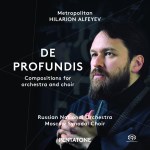 According
to Pentatone’s website Metropolitan Hilarion Alfeyev is ‘one of the
most widely performed of all living Russian composers’. Which probably
explains why I hadn’t heard of him until this recording was announced.
It’s a high-profile release, certainly looks intriguing, and while I
wasn’t sure what to expect I hadn’t bargained for this.
According
to Pentatone’s website Metropolitan Hilarion Alfeyev is ‘one of the
most widely performed of all living Russian composers’. Which probably
explains why I hadn’t heard of him until this recording was announced.
It’s a high-profile release, certainly looks intriguing, and while I
wasn’t sure what to expect I hadn’t bargained for this.
Apart from being a metropolitan (bishop) in the Russian Orthodox Church
Alfeyev is also a noted theologian and, yes, a composer. His fondness
for Bach may be gleaned from the track-list, and the fact that two of
his best-known works are a St Matthew Passion and a Christmas
Oratorio underlines that. Here he directs the prestigious Russian
National Orchestra – which I’ve just reviewed in a marvellous Leningrad
– as well as various soloists and the Moscow Synodal Choir. I’m surprised
that this recording was consigned to a studio rather than, say, a more
appropriate acoustic.
The Stabat Mater sets the tone for what’s to come; indeed, if
you’re expecting a traditional, darkly resonant piece the pale, skipping
minimalism of this opener will come as a rude shock. There’s little
of substance here and the choir sing without character or any real sense
of involvement. The ensuing Bach-inspired pieces – the Concerto
grosso and the Fugue on the B-A-C-H Motif – are even less
memorable. The recording is adequate, but it’s a far cry from Polyhymnia’s
immersive best. I suspect the venue has something to do with the rather
dry, closely focused sound here.
Alas, it doesn’t get any better; the four-movement Canciones de la
muerte, which includes an unsubtle soprano and a too-closely-miked
guitar, is devoid of invention, inflexion or intensity. Even worse,
the piece relies far too much on rudimentary rhythms. The orchestral
writing is monochromatic and it’s all delivered in such an unlovely
and unconvincing way.
At least the De profundis has pretensions to grandeur at the
outset, but then it’s back to the winding Bach-like figures that haunt
this music like a ghastly idée fixe. No, this is faux
seriousness, a soupy brand of churchiness that flies in the face of
a long and venerable musical tradition. At the very least this seems
to be a vanity project, and such things rarely turn out well. I’m sure
some listeners will warm to Alfeyev’s oeuvre, but on the evidence
presented here I doubt his music will make much of an impression outside
Russia.
No splendour or substance; grim.
Dan Morgan
Discovery of the Month
 I
hadn’t previously encountered the music of Joan TOWER (b.1938)
and the title of the first piece on a new Naxos recording, Stroke
(2011) [19:45], seemed pretty unpromising: it really is an emotional
reaction to her brother’s stroke and it receives a powerful performance
from the Nashville Symphony and Giancarlo Guerrero. It’s a first recording,
as is that of Chamber Dance (2006) [16:19] which rounds off the
CD, with theViolin Concerto (1991) [21:26] at the centre of the
programme, with Cho-Liang Lin as soloist. (8.559775 [57:30] –
from emusic.com
in 320kb/s mp3, no booklet, or sample/stream/download in lossless sound
with pdf booklet from Qobuz).
I
hadn’t previously encountered the music of Joan TOWER (b.1938)
and the title of the first piece on a new Naxos recording, Stroke
(2011) [19:45], seemed pretty unpromising: it really is an emotional
reaction to her brother’s stroke and it receives a powerful performance
from the Nashville Symphony and Giancarlo Guerrero. It’s a first recording,
as is that of Chamber Dance (2006) [16:19] which rounds off the
CD, with theViolin Concerto (1991) [21:26] at the centre of the
programme, with Cho-Liang Lin as soloist. (8.559775 [57:30] –
from emusic.com
in 320kb/s mp3, no booklet, or sample/stream/download in lossless sound
with pdf booklet from Qobuz).
Regular readers will know that I approach most contemporary music with
trepidation but I enjoyed this enough to seek out more of Joan Tower’s
music: I could easily get to like it. The artwork on the cover is a
good guide: it’s modern but comprehensible. If you can relate to the
Berg Violin Concerto, for example, you should be able to cope with Joan
Tower’s.
Jazz Bargain of the Month

Somewhat predictably, the recent death of B.B. King, whose name proclaims
exactly what he was, the King of the Blues, has brought forth at least
one tribute album: B.B. King – The Memorial Album from Sandrew
Metronome, 107 minutes for just £4.79 in lossless sound from Qobuz,
where it can be sampled by all and streamed by subscribers. It’s just
one of 542 albums which you can find there – some of them duplicates,
but it’s still an impressive total – by searching for ‘BB King’.
If you buy only one jazz recording this month, it should be by BB.



 All Nimbus reviews
All Nimbus reviews








